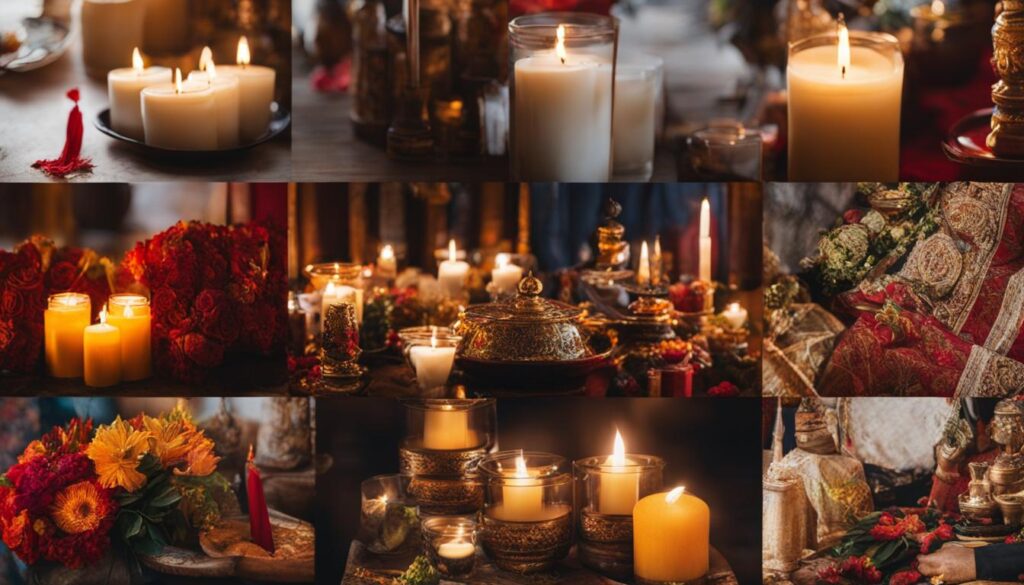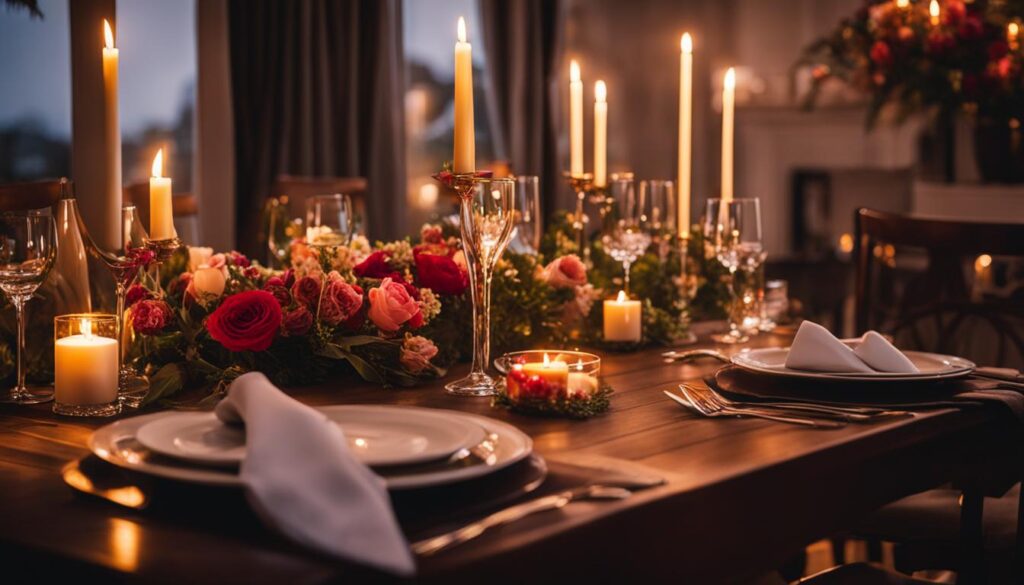We may earn money or products from the companies mentioned in this post.
Whether it’s a wedding, graduation, or baby shower, ceremonies are an essential part of celebrating life’s milestones. Ceremonies help us mark significant events, create lasting memories, and honor our values and beliefs. However, with so many different ceremony types to choose from, it can be challenging to know where to start.
In this section, we’ll explore various ceremony types, including traditional, religious, non-religious, and modern ceremonies. We’ll highlight the unique customs and traditions associated with each, and provide you with inspiration for making your special occasion unforgettable.
Key Takeaways
- There are various types of ceremonies for every special occasion.
- Ceremonies are a way to mark significant events, create lasting memories, and honor our beliefs.
- Traditional, religious, non-religious, and modern ceremonies are some of the ceremony types to consider.
- Understanding the unique customs and traditions associated with each ceremony type can help you choose the right one for your special occasion.
- The ceremony you choose should reflect your personal values, preferences, and traditions.
Types of Wedding Ceremonies
When it comes to weddings, there are various types of ceremonies to choose from. From traditional to modern, each ceremony type has its unique customs and rituals. Let’s take a closer look at some of the most popular ones:
Traditional Ceremony Types
Traditional wedding ceremonies are steeped in cultural and religious heritage. There are many types of traditional ceremonies, depending on the couple’s cultural background, such as:
| Cultural Background | Traditional Ceremony Type |
|---|---|
| Western | Christian |
| African-American | Jumping the broom |
| Indian | Hindu |
| Korean | Paebaek |
In a traditional wedding ceremony, the couple exchanges vows and rings, and there may be religious readings and blessings. They may also participate in cultural rituals, such as the breaking of a glass in a Jewish ceremony or the tying of a cord in a Filipino ceremony.
Modern Ceremony Types
Modern weddings have evolved to reflect the values and lifestyles of contemporary couples. Some modern ceremony types include:
- Destination weddings
- Elopements
- Themed weddings
- Same-sex weddings
- Alternative wedding ceremonies, such as handfasting or sand ceremonies
Modern ceremonies may also incorporate non-traditional vows, readings, and music, allowing couples to express their individual styles and personalities.
Conclusion
Choosing a wedding ceremony type is a personal decision that should reflect the couple’s beliefs, values, and preferences. Traditional ceremonies honor cultural and religious customs, while modern ceremonies allow couples to express their creativity and individuality. Whether you opt for a traditional or modern ceremony, the most important thing is to make it a memorable and meaningful experience for you and your loved ones.
Religious Ceremony Types
For many people, incorporating religious traditions and customs is an essential part of their special occasion. Religious ceremonies are deeply meaningful and can provide a sense of connection to history, family, and community. Here are some of the most common religious ceremony types:
Christian Ceremonies
Christian ceremonies come in many forms and can vary depending on the denomination. However, most Christian ceremonies include elements such as prayers, hymns, scripture readings, and a sermon. The exchanging of vows and rings is also common, symbolizing the couple’s commitment to each other.
Jewish Ceremonies
Jewish ceremonies, known as weddings under the chuppah, are steeped in tradition and symbolism. The chuppah, a canopy, represents the new home the couple will build together. The ceremony includes blessings, the exchange of rings, and the breaking of a glass to symbolize the fragility of life. Jewish ceremonies also often involve a ketubah, a marriage contract signed by the couple.
Hindu Ceremonies
Hindu ceremonies are colorful and vibrant, reflecting the rich cultural heritage of India. The ceremony, known as a Vivaah Sanskar, involves many rituals, including the exchange of floral garlands, the tying of a sacred thread around the groom’s neck, and circling the sacred fire seven times. The ceremony concludes with the newlyweds receiving the blessings of their elders.
Muslim Ceremonies
Muslim ceremonies, known as Nikah, involve the signing of a marriage contract, known as a katb al-kitab. The ceremony includes the recitation of prayers, the exchange of rings, and a sermon by the Imam. The ceremony concludes with a communal dua, or prayer, and the couple’s families offering their blessings.
Buddhist Ceremonies
Buddhist ceremonies focus on the spiritual aspects of marriage and involve chanting, meditation, and offerings to the Buddha. The couple may exchange vows, rings, and offer prayers for their future together. In some traditions, the couple may also receive teachings from a monk or nun.
Sikh Ceremonies
Sikh ceremonies, known as Anand Karaj, are rooted in the Sikh faith and involve the couple walking around the Guru Granth Sahib, the Sikh holy book, four times. The ceremony includes the exchange of garlands, the tying of a wedding scarf known as a phulkari, and the sharing of a sweet pudding known as Kara Prasad to symbolize the couple’s union.
“Religious ceremonies are not just about the couple, but also about their families and communities. They are a powerful way of connecting with one’s heritage, values, and beliefs.”
Non-Religious Ceremony Types
For those who prefer a non-religious approach, there are many unique ceremony types to choose from that can reflect your personal beliefs and values. Here are some ideas:
- Secular Ceremonies: These ceremonies are entirely non-religious and focus on celebrating the couple’s love and commitment. They can be customized with personal vows, readings, and music.
- Humanist Ceremonies: These ceremonies also have a non-religious focus, but they incorporate philosophical elements that celebrate the human experience and human values.
- Destination Ceremonies: These ceremonies take place in a special location away from the couple’s hometown. They can be personalized to reflect the couple’s shared interests or hobbies.
Non-religious ceremonies often provide a blank canvas for couples to create a ceremony that is truly unique and personal. They can incorporate cultural traditions, alternative rituals, or quirky elements, making the ceremony a reflection of the couple’s personality and relationship.
“The beauty of a non-religious ceremony is that you can create something that truly reflects who you are as a couple, without any rules or restrictions.”
Traditional Ceremony Types
Traditional ceremonies are steeped in cultural heritage and often prioritize longstanding customs and values. They can add a meaningful touch to weddings and other special occasions, making them truly unforgettable.
Traditional Ceremony Types for Weddings
There are a variety of traditional ceremony types that are popular for weddings. Some examples include:
| Ceremony Type | Description |
|---|---|
| Christian | A Christian wedding ceremony often includes scripture readings, prayers, and hymns. The bride and groom may exchange vows and rings, and a priest or minister typically officiates. |
| Jewish | A Jewish wedding ceremony may include the signing of a ketubah, the breaking of a glass, and the reading of the seven blessings. The ceremony is typically officiated by a rabbi. |
| Hindu | A Hindu wedding ceremony may include the exchange of garlands between the bride and groom, the tying of a mangalsutra, and the circling of a sacred fire. The ceremony is typically officiated by a pandit. |
| Muslim | A Muslim wedding ceremony may include the signing of a marriage contract, the exchange of rings, and the recitation of prayers. The ceremony is typically officiated by an imam. |
These traditional ceremonies often include rich symbolism and meaningful rituals that highlight the couple’s cultural background and religious beliefs.
Unique Traditional Ceremony Types
While many traditional ceremony types are associated with weddings, there are also unique traditional ceremonies for other special occasions. Here are a few examples:
- Quinceañera: A celebration of a girl’s 15th birthday in Latin American cultures, featuring a traditional ceremony that symbolizes her transition from childhood to adulthood.
- Coming of Age: A traditional ceremony in many cultures to celebrate a young person’s transition to adulthood, often marked by a rite of passage or initiation ceremony.
- Funeral: Many cultures have specific traditional ceremonies associated with funerals, such as Irish wakes or Japanese funerals.
These unique traditional ceremonies can add a special touch to any special occasion, offering a unique way to celebrate cultural heritage and longstanding customs.
Whether you opt for a traditional ceremony type or a more modern approach, the key is to choose something that reflects your personal values and creates lasting memories.
Modern Ceremony Types for Weddings
Today’s couples are looking for unique ways to make their wedding ceremonies more personalized and exciting. Modern ceremony types offer a perfect opportunity to showcase your style and creativity. Below are some ideas to get you started:
- Destination Wedding: If you and your partner love to travel, why not make your wedding a destination event? This modern ceremony type allows you to exchange vows in a breathtaking location, whether it be a tropical beach or a European castle. Not only will you have a memorable wedding, but also a honeymoon to remember.
- Themed Wedding: A themed wedding allows you to express your interests and passions in a creative and fun way. Whether you’re into comic books, movies, or sports, you can customize your ceremony with decor, attire, and even music that reflect your chosen theme. A themed wedding will create a unique atmosphere that your guests will never forget.
- Intimate Wedding: For those who prefer a more low-key ceremony, an intimate wedding may be the perfect option. This ceremony type focuses on the love between the couple and their closest family and friends. It can take place in a small venue or even in your own backyard, adding a personal touch to the event.
Making Modern Ceremony Types Work for You
When choosing a modern ceremony type, it’s essential to consider your preferences, budget, and venue. Here are some factors to keep in mind:
| Factor | Considerations |
|---|---|
| Personal Style | Choose a ceremony type that reflects your personality and relationship with your partner. Remember, this is your day. |
| Guest List | Ensure that the ceremony type you choose can accommodate your guest list and provides a comfortable experience for everyone. |
| Budget | Consider the costs associated with the ceremony type you choose, including venue, decor, and attire. Make sure it is within your budget without compromising on quality. |
| Location and Setting | Choose a ceremony type that complements your venue’s setting and location. Your chosen ceremony type should blend in seamlessly with the surroundings. |
With these factors in mind, you can choose the perfect modern ceremony type that suits your preference and style.
Ceremony Types for Other Special Occasions
Ceremonies are not limited to weddings alone. Whether it’s a graduation, a baby shower, or an anniversary, incorporating a ceremony can add a special touch to any significant milestone in life. Here are some unique ceremony types that you can consider:
Baby Naming Ceremony
A baby naming ceremony is a non-religious ceremony that celebrates the arrival of a new baby and formally introduces them to family and friends. During the ceremony, parents introduce their child to loved ones, share the inspiration behind the baby’s name choice, and make vows and promises for their child’s future.
Graduation Ceremony
A graduation ceremony is a formal event that marks the completion of an academic program. Whether it’s high school, college, or a specialized training program, graduations are a great way to celebrate academic achievements. The ceremony typically includes speeches, the conferring of degrees or diplomas, and the turning of tassels.
Renewal of Vows Ceremony
A renewal of vows ceremony is a special celebration that allows married couples to renew their commitment to each other. Couples can customize the ceremony to reflect their unique love story and reaffirm their bond in front of family and friends. This ceremony can be particularly meaningful for couples celebrating a significant anniversary or overcoming a difficult period in their relationship.
Retirement Ceremony
A retirement ceremony celebrates the end of a career and the beginning of a new chapter in life. It can be a formal or informal event, depending on the retiree’s preferences. During the ceremony, coworkers, family, and friends can offer speeches, gifts, and well wishes for the retiree’s future endeavors.
Anniversary Ceremony
An anniversary ceremony is a beautiful way to celebrate a couple’s love and commitment. It can be a simple ceremony, such as renewing vows, or a more elaborate event with family and friends. During the ceremony, couples can reflect on their achievements and make new promises for their future together.
There are many other ceremony types that can be tailored to your specific needs and preferences. Whether it’s a christening, a quinceañera, or a housewarming ceremony, the possibilities are endless. With a bit of creativity and planning, you can make any special occasion truly unforgettable.
Conclusion
Ceremonies play a significant role in celebrating life’s important milestones. With a variety of ceremony types available, you can choose one that best reflects your values and beliefs while making your special day unforgettable. It is essential to consider factors such as cultural and religious backgrounds, personal preferences, and the nature of the occasion when selecting the appropriate ceremony type.
Tailored Ceremonies for Every Occasion
From weddings to graduations and baby showers, ceremonies can add a meaningful touch to any special occasion. Depending on the type of event, you can choose from a wide range of ceremony types, including traditional, modern, religious, and non-religious ceremonies. Each ceremony type has its own unique customs, symbolism, and rituals that create lasting memories for everyone involved.
Reflecting Your Values and Beliefs
When choosing a ceremony type, it’s important to consider your personal values and beliefs. Traditional ceremonies often emphasize cultural heritage, while modern ceremonies focus on contemporary values and trends. Non-religious ceremonies can be customized to reflect your personal beliefs and values, while religious ceremonies incorporate specific customs and traditions associated with the faith.
Celebrating Life’s Milestones
Whether it’s a wedding ceremony that marks the beginning of a new life together or a graduation ceremony that celebrates academic achievement, ceremonies are a way of honoring life’s milestones. They bring families and communities together and provide an opportunity to reflect on the significance of the occasion. It’s a time to celebrate accomplishments, remember loved ones, and look forward to the future.
So, whether you opt for a traditional, religious, non-religious, or modern ceremony, embrace the diversity of ceremony types, and make your special occasions truly unforgettable.
FAQ
What types of ceremonies will be discussed in this article?
This article will explore a variety of ceremony types for different special occasions, including weddings, religious ceremonies, non-religious ceremonies, traditional ceremonies, modern ceremonies, and ceremonies for other special occasions.
What is the difference between traditional and modern ceremony types?
Traditional ceremony types often emphasize cultural heritage and longstanding customs, while modern ceremony types reflect contemporary values and trends. Traditional ceremonies focus on preserving cultural traditions, while modern ceremonies embrace innovation and alternative approaches.
What are some examples of non-religious ceremony types?
Non-religious ceremony types include secular ceremonies and humanist ceremonies. These ceremonies are customizable and focus on personal beliefs and values rather than religious elements.
Can ceremonies be customized for individual preferences and beliefs?
Yes, ceremonies can be tailored to reflect individual preferences and beliefs. Whether it’s incorporating religious elements, cultural traditions, or personal touches, ceremonies can be customized to make each event unique and meaningful.
Are there ceremony types for occasions other than weddings?
Absolutely! Ceremonies are not limited to weddings alone. There are ceremony types for various special occasions, including graduations, baby showers, anniversaries, and more. These ceremonies can add a meaningful touch to any important milestone in life.
How can ceremonies create lasting memories?
Ceremonies provide an opportunity to celebrate and commemorate important milestones in life. By incorporating meaningful rituals, traditions, and personal touches, ceremonies can create lasting memories for everyone involved. They are a way to honor and mark significant moments in a unique and memorable way.
Affiliate Disclosure: This post may contain affiliate links. If you purchase through our link, we may receive a small commission, but at no additional cost to you. For more information, please see our Disclosure statement.



